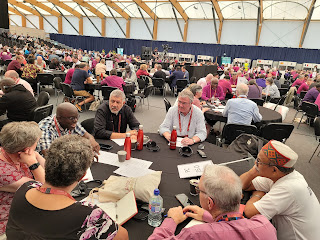I suspect that Jesus would have liked slapstick comedy. You know, the Laurel and Hardy sort of humor. Remember? Laurel will be eating a banana and throw the peel on the ground. And you know, as soon as you see Hardy walking up the road what’s going to happen. It’s the pratfall, the trip, the rug pulled out from under your feet, the banana peel in the way.
Jesus seems to have had a liking for that sort of thing, continually pulling the rug out from under our feet or tossing banana peels in our path. His parables are often like banana peels tossed on the pathway of our moral self-satisfaction.
This morning’s parable, in particular, is such a banana peel. It’s a familiar story – the Pharisee and the Tax Collector praying at the temple. In fact, it’s so familiar it has lost some of its edge for us. We already know who is the good guy and who the bad guy.
Jesus’ original hearers would not have been so sure. The Pharisees were not known as necessarily self-righteous or righteous in any other way than the way we all hope to be righteous. The Pharisees were part of movement of lay people who had a passion for seeking after God’s heart, for living according to the Torah – for living faithfully so that all Israel might be redeemed. If anything, Jesus had much in common with the Pharisees
Tax Collectors, on the other hand, everyone knew and no one liked. Even under the best of circumstances few people are excited when they see the tax man coming. But in a time when you are occupied and oppressed by a foreign nation, tax collectors are even worse. Not only are they taking some of your money to run the government, but the government they are taking money to run is a foreign occupier. Tax collectors would have been seen as the collaborators with the enemy, with the oppressor. The last thing you would want your son to grow up to be would be a tax collector.
And so in this parable we have the Pharisee and the Tax Collector. The Pharisee prays to God, recounting all the good things that he has done – good things that everybody would have recognized as good things. He fasts. He tithes. He is a regular worshipper. All the things that we hope to be ourselves.
Of course, as he is praying and recounting all the good things, he has one eye open to those around him. The Pharisee prays with peripheral vision, looking to either side at those who might not quite measure up to his standards: all the rogues, the prostitutes, thieves, adulterers, and, maybe even especially, this tax collector (we all know what sorts of people they are). The Pharisee is confident that he is on the right track, that he is dotting all the i’s and crossing all the t’s. Not like so many other people.
The Tax Collector, on the other hand, as everyone would have known, is all undotted i's and uncrossed t's. And he knows it. He prays the only honest prayer he can pray, “God have mercy on me, a sinner.”
The Pharisee is a moral, upright person. He is on the straight and narrow. But it is on that straight and narrow that Jesus tosses his banana peel, and the Pharisee who has every reason to think that he is right with God slips on the peel and falls. Meanwhile, the Tax Collector who has every reason to think that he is out of sorts with God goes home justified.
And I suspect those who heard Jesus tell this parable slipped on the banana peel as well. What kind of a morally uplifting story is that? Not the kind of story you want to tell your children. They might take it seriously. The just person is condemned and the contemptible person is justified? Jesus doesn’t even suggest that the Tax Collector went home to live differently. He only throws himself on God’s mercy.
The point is not that being a tax collecting collaborator is a matter of indifference to Jesus. The point is that the Pharisee is in as much need of God’s mercy as is the Tax Collector. As are we all. And, of course, we all get that now. Don’t we? Don’t we?
There is a third person implied in this parable. This person is praying as well, and watching both the Pharisee and the tax collector. We are the third person. If we’re not careful, there is a banana peel in our path as well. How often do we see this parable and say, “Thank you, God, that I am not self-righteous, like that Pharisee"?
We all slip on the banana peel sooner or later. We measure ourselves against others. Whether it is the righteous and the unrighteous, the holy or the unholy, the mature or the immature, the sophisticated or the unsophisticated, the just and the unjust. We all fall into the trap of keeping score. Thank God I am not like that liberal. Thank God I am not like that conservative. Thank God I am not like that fundamentalist. One way or another, we are usually pretty sure that we are the ones who get it. We are the ones who are superior. We are the ones who are on the side of the angels.
Again and again Jesus tosses a banana peel on our path to moral superiority, our own exalted opinion of ourselves. We are reminded that we don’t know as much as we think we do. We are reminded that we are not as good as we like to think we are. We are reminded that our perspective is not God’s. We are reminded that we often slip into our own version of the Pharisee in this parable. We slip and land on our moral backsides.
By God's grace we are humbled and reminded, yet again, that our only honest prayer is, “God, have mercy on me a sinner.” In fact, the only prayer that is anything other than stammering, and the only deed that is anything other than stumbling, is the one that begins and ends with, “Have mercy on me, a sinner.”
Have heard the story of the man who dies and goes to the Pearly Gates where he is met by St. Peter?
Peter says, “Before you get in, you have to pass this little test. You have to make sure you have scored enough points to get in. You have to get one hundred points.”
The man thinks that should not be too hard because he has, after all, led a very good life. So he says to St. Peter, “Well, first of all, I was married for 57 years to one woman and was faithful from the very beginning until the very end.
Peter says, “That’s impressive. Three points.”
Then the man says, “Well, I also was a regular at church, Sunday in and Sunday out."
Peter gives him another point.
The man tries again, “I tithed. I gave 10% of everything I earned to the church and to the poor
Peter says, “Well, good for you. That’s another three points.”
“Did you know that I also volunteered for the youth group for five years? Do you know how many lock-ins that is!?”
“Four points.”
“I was politically active and always voted for the right candidate”
“Another point.”
The points are not adding up very fast. The man begins to despair. He says, “Well, how about this?” “What about that?” But his score remains distressingly low.
Finally, the man beats his breast in despair and cries out, “At this rate the only way that I’ll get into Heaven is by the mercy of God!”
Peter smiles and says “One hundred points!”
The first word for Christians is grace The last word for Christians is grace; and every day, along the way, is grace, grace, grace.
That’s not good news for the Pharisee in us who wants to keep score. It is very good news for the Tax Collector in us who can only pray,
“God have mercy on me, a sinner.”
Watch out for those banana peels.






.jpg)